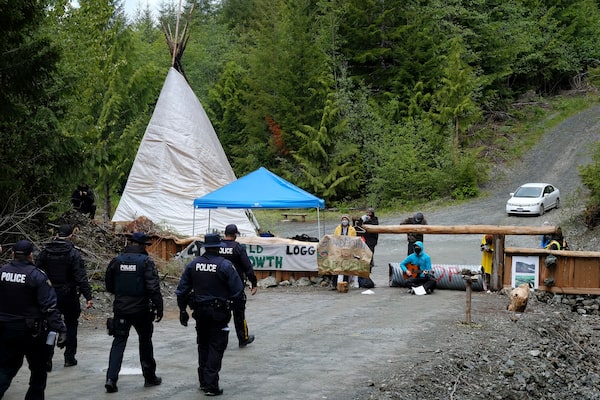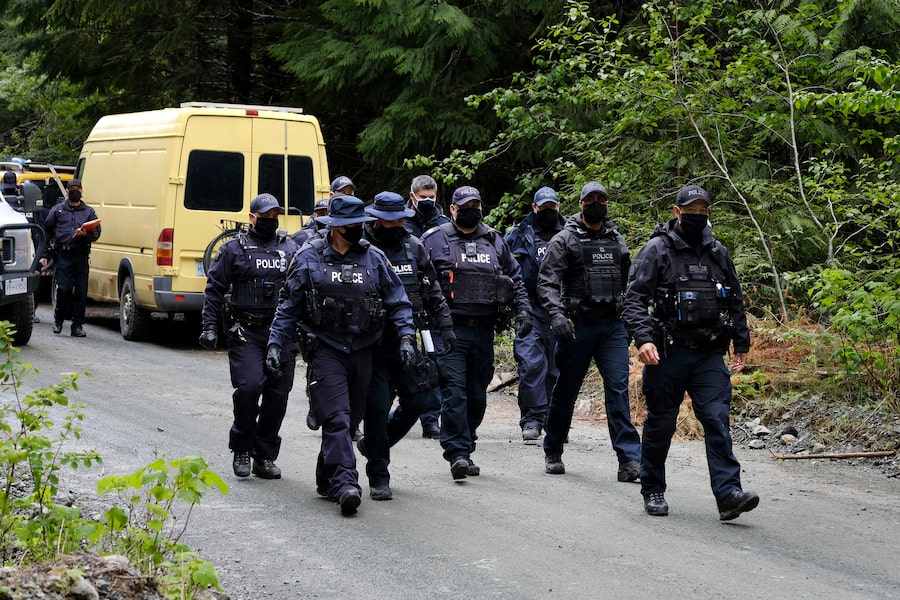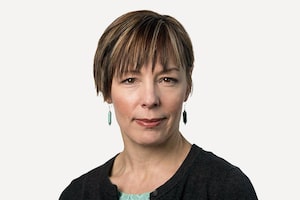
A watch camp that was recently abandoned because members formed a new blockade a few kilometres away, is shown inf the Fairy Creek area near Port Renfrew, B.C. on Tuesday, May, 11, 2021.Jen Osborne/The Canadian Press
Six protesters blocking logging roads in the Fairy Creek watershed on Vancouver Island were arrested Saturday as RCMP sought to enforce a court order allowing the Teal-Jones Group to begin its operations.
The half-dozen people arrested included a group of protesters who had chained themselves together at the headwaters of Fairy Creek to stop logging of old growth forests. The group sang as police used a heavy bolt cutter to remove the chain and carry them away. Police officers gave the protesters protective gear such as safety glasses as they cut the chain.
Environmental activist Tzeporah Berman, a veteran of forestry protests, was immediately arrested after sitting down with the chained demonstrators.
Over the past week, 59 people have been arrested since the RCMP began enforcing the court injunction at several camps in the watershed, which is near Port Renfrew, about 80 kilometres northwest of Victoria.
Tzeporah Berman: Why I continue to fight for British Columbia’s old-growth forests
Old-growth forest experts release map urging B.C. to act quickly on logging deferrals
The camps, organized by a group calling itself the Rainforest Flying Squad, have kept logging at bay since last August.
Duncan Morrison, who has been involved with the camps for the past nine months, said the surrounding forest contains yellow cedar trees that are estimated to be 2,000 years old
“It’s morally reprehensible to log this,” he said, as RCMP officers carried one demonstrator away on a tarp.
Police set up a checkpoint farther down the mountain on a narrow logging road, allowing in only some media and legal monitors. Indigenous youth were denied access to the camp.
A detailed map on Pacheedaht First Nation land part of the ever shrinking base of ancient trees at the Ferry Creek Blockade near Port Renfrew, B.C., on Friday, March 12, 2021.CHAD HIPOLITO/The Globe and Mail
Victor Peter is a member of the Pacheedaht First Nation, and although his band has sanctioned the logging activity, he opposes the logging of old growth in his nation’s traditional territory. He said in an interview that he was following his traditional teachings by supporting the protest.
Patrick Victor-Jones, who is also from the Pacheedaht and who said his father is a hereditary chief, said the band leadership’s endorsement of the logging operation “was not a unanimous decision.”
The Pacheedaht have three sawmills, and Teal-Jones has stressed that it has obtained Indigenous consent for its operations.
The RCMP said in a news release issued late Saturday that in addition to the six people arrested at the camp, another 25 were arrested after a large group of demonstrators blocked a road near a police checkpoint.
The protesters arrested in the past week have faced charges including civil contempt of court for breaching an injunction and obstruction of justice.
Earlier in the week, the RCMP managed to clear an area along a forest service road west of Lake Cowichan, but several protesters returned, attaching themselves to structures.
Activists say very few of the best old-growth forest remains in B.C., and Fairy Creek is the last unprotected, intact old-growth valley on southern Vancouver Island. The valley is in Premier John Horgan’s riding.
But the company, Teal-Jones, says about 200 hectares of the 1,200-hectare watershed is available for harvest and the rest is either protected or on unstable terrain.
The company has said it plans to harvest about 20 hectares on the north ridge of the watershed that contains mostly hemlock and cypress trees.
Teal-Jones vice-president Gerrie Kotze said in a statement earlier in week that the company respects peaceful protests and has a “decades-long history of engagement with First Nations, responsible forest management, and value-added manufacture” in B.C.
The company’s work within its tree farm licence is “undertaken in accordance with British Columbia’s strong environmental regulations and only after meaningful engagement with First Nations,” he said.

RCMP officers approach an anti-logging blockade in Caycuse, B.C. on Tuesday, May 18, 2021.Jen Osborne/The Canadian Press
Fairy Creek features increasingly rare intact stands of western redcedar and yellow cedar trees, which are up to 800 years old. During last fall’s election, Mr. Horgan promised to act to protect old-growth areas, but environmentalists say progress has been glacial.
Logging continues on the central coast without the extra oversight promised and the province has been called out by its own independent watchdog for failing to protect the biodiversity values the province already has.
High prices for lumber are expected to pad depleted provincial revenues: B.C. expects to reap $1.1-billion in forestry revenues. Logging in old-growth areas has increased, not decreased, in the past year.
Vancouver police warn of spike in construction thefts as lumber prices rise
U.S. seeks to double tariff rates against most Canadian softwood lumber
For Teal-Jones, which has been missing out on that windfall due to the blockades at Fairy Creek, logging crews are just getting to work.
“We will continue responsible harvesting where it is safe, and in consultation with RCMP,” the company said in a statement.
It’s not just the Fairy Creek logging that has galvanized environmentalists. The Great Bear Rainforest agreement, reached with great fanfare five years ago to protect the largest coastal temperate rainforest on the planet, remains bogged down in planning and consultation.
The province’s NDP government, re-elected last fall with a commitment to lead a paradigm shift in forestry, is mired in planning and consultation.
The 2016 Great Bear Rainforest agreement, which followed 20 years of negotiations between environmentalists, forestry companies, Indigenous communities and the provincial government, was forged under market pressure.
More than 80 companies, including Home Depot, Staples and IKEA, had been persuaded to stop selling products made from B.C.’s old-growth forests. The deal’s signing brought those customers back – with the promise that buying B.C. forestry products would help them meet their own commitments to environmental values.
British Columbia reaped international accolades for the deal, which applied to 6.4 million hectares of the coast from the north of Vancouver Island to the Alaska Panhandle.

An excavator works in the background as police establish a checkpoint on McClure Main, a road that leads to the Cayacuse blockade camp, in the Cayacuse area on B.C.'s Vancouver Island, Monday, May 17, 2021.Jen Osborne/The Canadian Press
The agreement promised to protect 85 per cent of the region’s old-growth forests, with logging in the remaining 15 per cent subject to the most stringent standards in North America.
But since it was signed, more than 10 million cubic metres of timber have been harvested in the Great Bear without the enforcement mechanisms that were supposed to ensure ecosystem-based management would be applied.
B.C. is home to 57 million hectares of forests, but ancient, temperate rainforests are astonishingly rare. A recent study found that those highly productive, intact ecosystems make up less than one per cent of B.C.’s remaining forests.
In 2019, the government set up an expert panel to review the divisive issue of old-growth logging. The panel’s report was not released until last fall, and during the election campaign, the NDP promised to enact all of the panel’s recommendations.
We have a weekly Western Canada newsletter written by our B.C. and Alberta bureau chiefs, providing a comprehensive package of the news you need to know about the region and its place in the issues facing Canada. Sign up today.












 Justine Hunter
Justine Hunter